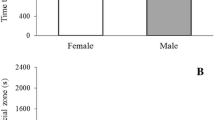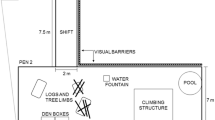Abstract
A fundamental question in behavioural and evolutionary ecology is to what degree individual phenotypic traits are variable over time and across ecological contexts and whether they are correlated with each other, as (co)variation in traits determines in part their responses to selection and rate of evolution. A first step to addressing this question is to characterize variation in behavioural traits within and among individuals and their covariation in particular ecological contexts. Here, we ascertained whether adult female guppies (Poecilia reticulata), descendants of wild guppies in Trinidad, are consistent or repeatable in their behaviour over time, such that they exhibit individual ‘personalities’ or behavioural types, and whether their personality traits are inter-correlated. Using a repeated-measures design, we twice assayed individual females for each of three ecologically important behavioural traits, Exploration (of a novel environment), Sociability (shoaling with conspecifics) and Boldness (risk taking), under standardized laboratory conditions. We characterized the among-individual (co)variance structure of each behavioural trait measure, and estimated their respective repeatability and the among-individual correlations between these traits using mixed-effects models. All three traits were found to be significantly repeatable and thus can be considered personality traits. None of the estimated correlations between all possible pairings of the three traits were significantly different from zero. Although adult female Trinidadian guppies from our study population exhibited repeatable personality traits, these traits were not inter-correlated (i.e. did not constitute a behavioural syndrome) and were thus independent of each other. Our findings have important implications for the maintenance of behavioural variation within populations and trait evolution.


Similar content being viewed by others
References
Auer SK, Dick CA, Metcalfe NB, Reznick DN (2018) Metabolic rate evolves rapidly and in parallel with the pace of life history. Nature Comm 9:14
Bell A (2013) Randomized or fined order for studies of behavioural syndromes? Behav Ecol 24:16–20
Bell AM, Sih A (2007) Exposure to predation generates personality in threespined sticklebacks (Gasterosteus aculeatus). Ecol Lett 10:828–834
Bell AM, Hankinson SJ, Laskowski KL (2009) The repeatability of behaviour: a meta-analysis. Anim Behav 77:771–783
Brown GE, Godin J-GJ (1999) Chemical alarm signals in wild Trinidadian guppies (Poecilia reticulata). Can J Zool 77:562–570
Brown C, Irving E (2014) Individual personality traits influence group exploration in a feral guppy population. Behav Ecol 25:95–101
Budaev SV (1997) “Personality” in the guppy (Poecilia reticulata): a correlational study of exploratory behavior and social tendency. J Comp Psychol 111:399–411
Burns JG (2008) The validity of three tests of temperament in guppies (Poecilia reticulata). J Comp Psychol 122:344–356
Conrad JL, Weinersmith KL, Brodin T, Saltz JB, Sih A (2011) Behavioural syndrome in fishes: a review with implications for ecology and fisheries management. J Fish Biol 78:395–435
Croft DP, Albanese B, Arrowsmith BJ, Botham M, Webster M, Krause J (2003) Sex-biased movement in the guppy (Poecilia reticulata). Oecologia 137:62–68
Croft DP, Krause J, Darden SK, Ramnarine IW, Faria JJ, James R (2009) Behavioural trait assortment in a social network: patterns and implication. Behav Ecol Sociobiol 63:1495–1503
Dall SRX, Houston AI, McNamara JM (2004) The behavioural ecology of personality: consistent individual differences from an adaptive perspective. Ecol Lett 7:734–739
Dall SRX, Bell AM, Bolnick DI, Ratnieks FLW (2012) An evolutionary ecology of individual differences. Ecol Lett 15:1189–1198
Diaz Pauli B, Wiech M, Heino M, Utne-Palm AC (2015) Opposite selection on behavioural types by active and passive fishing gears in a simulated guppy Poecilia reticulata fishery. J Fish Biol 86:1030–1045
Dingemanse NJ, Dochtermann NA (2013) Quantifying individual variation in behaviour: mixed-effect modelling approaches. J Anim Ecol 82:39–54
Dingemanse NA, Réale D (2005) Natural selection and animal personality. Behaviour 142:1159–1184
Dingemanse NJ, Wright J, Kazem AJN, Thomas DK, Hickling R, Dawnay N (2007) Behavioural syndromes differ predictably between 12 populations of three-spined stickleback. J Anim Ecol 76:1128–1138
Dingemanse NJ, Kazem AJN, Réale D, Wright J (2010) Behavioural reaction norms: animal personality meets individual plasticity. Trends Ecol Evol 25:81–89
Dingemanse NJ, Barber I, Wright J, Brommer JE (2012) Quantitative genetics of behavioural reaction norms: genetic correlations between personality and behavioural plasticity vary across stickleback populations. J Evol Biol 25:485–496
Dochtermann NA, Schwab T, Sih A (2015) The contribution of additive genetic variation to personality variation: heritability of personality. Proc R Soc B 282:20142201
Dugatkin LA (1992) Tendency to inspect predators predicts mortality risk in the guppy (Poecilia reticulata). Behav Ecol 3:124–127
Dugatkin LA, Godin J-GJ (1992a) Predator inspection, shoaling and foraging under predation hazard in the Trinidadian guppy, Poecilia reticulata. Environ Biol Fish 34:265–276
Dugatkin LA, Godin J-GJ (1992b) Prey approaching predators: a cost-benefit perspective. Ann Zool Fennici 29:233–252
Dyer JRG, Croft DP, Morrell LJ, Krause J (2009) Shoal composition determines foraging success in the guppy. Behav Ecol 20:165–171
Endler JA (1995) Multiple-trait coevolution and environmental gradients in guppies. Trends Ecol Evol 10:22–29
Fischer EK, Ghalambor CK, Hoke KL (2016) Plasticity and evolution in correlated suites of traits. J Evol Biol 29:991–1002
Freeman S, Herron JC (2001) Evolutionary analysis, 2nd edn. Prentice-Hall Inc., Upper Saddle River, NJ
Godin J-GJ (1986) Antipredator function of shoaling in teleost fishes: a selective review. Nat can (Rev Écol Syst) 113:241–250
Godin J-GJ (1995) Predation risk and alternative mating tactics in male Trinidadian guppies (Poecilia reticulata). Oecologia 103:224–229
Godin J-GJ (1997) Evading predators. In: Godin J-GJ (ed) Behavioural ecology of teleost fishes. Oxford University Press, Oxford, pp 191–236
Godin J-GJ, Davis SA (1995) Who dares, benefits: predator approach behaviour in the guppy (Poecilia reticulata) deters predator pursuit. Proc R Soc B 259:193–200
Godin J-GJ, Dugatkin LA (1996) Female mating preference for bold males in the guppy, Poecilia reticulata. Proc Natl Acad Sci U S A 93:10262–10267
Gordon SP, Reznick D, Arendt JD, Roughton A, Ontiveros Hernandez MN, Bentzen P, López-Sepulcre A (2015) Selection analysis on the rapid evolution of a secondary sexual trait. Proc R Soc B 282:20151244
Hadfield JD (2010) MCMC methods for multi-response generalized mixed models: the MCMCglmm R package. J Stat Software 33:1–25
Harris S, Ramnarine IW, Smith HG, Pettersson LB (2010) Picking personalities apart: estimating the influence of predation, sex and body size on boldness in the guppy Poecilia reticulata. Oikos 119:1711–1718
Houslay TM, Wilson AJ (2017) Avoiding the misuse of BLUP in behavioural ecology. Behav Ecol 28:948–952
Houslay TM, Vierbuchen M, Grimmer AJ, Young AJ, Wilson AJ (2018) Testing the stability of behavioural copying style across stress contexts in the Trinidadian guppy. Funct Ecol 32:424–438
Irving E, Brown C (2013) Examining the link between personality and laterality in a feral guppy Poecilia reticulata population. J Fish Biol 83:311–325
Jones KA, Godin J-GJ (2010) Are fast explorers slow reactors? Linking personality type and anti-predator behaviour. Proc R Soc B 277:625–632
Kobler A, Engelen B, Knaepkens G, Eens M (2009) Temperament in bullheads: do laboratory and field explorative behaviour variables correlate? Naturwissenschaften 96:1229–1233
Krause J, Godin J-GJ (1995) Predator preferences for attacking particular prey group sizes: consequences for predator hunting success and prey predation risk. Anim Behav 50:465–473
Krause J, Ruxton GD (2000) Living in groups. Princeton University Press, Princeton
Lima SL, Dill LM (1990) Behavioral decisions made under the risk of predation: a review and perspective. Can J Zool 68:619–640
Magurran AE (2005) Evolutionary ecology: the Trinidadian guppy. Oxford University Press, Oxford
Mazué GF, Dechaume-Moncharmont F-X, Godin J-GJ (2015) Boldness-exploration behavioural syndrome: interfamily variability and repeatability of personality traits in the young of the convict cichlid (Amatitlania siquia). Behav Ecol 26:900–908
Nakagawa S, Schielzeth H (2010) Repeatability for Gaussian and non-Gaussian data: a practical guide for biologists. Biol Rev 85:935–956
Näslund J, Bererhi B, Johnsson JI (2015) Design of emergence test arenas can affect the results of boldness assays. Ethology 121:556–565
R Code Team (2017) R: A Language and Environment for Statistical Computing, Version 3.3.3. R Foundation for Statistical Computing, Vienna, Austria. Available from https://www.r-project.org/. Accessed 6 March 2017
Rasmussen JE, Belk MC (2012) Dispersal behavior correlates with personality of a north American fish. Curr Zool 58:260–270
Réale D, Reader SM, Sol D, McDougall PT, Dingemanse NJ (2007) Integrating animal temperament within ecology and evolution. Biol Rev 82:291–318
Reznick DN, Shaw FH, Rodd FH, Shaw RG (1997) Evaluation of the rate of evolution in natural populations of guppies (Poecilia reticulata). Science 275:1934–1937
Schluter D (2000) The ecology of adaptive radiation. Oxford University Press, Oxford
Sih A, Bell AM (2008) Insights for behavioral ecology from behavioral syndromes. Adv. Study Behav 38:227–281
Sih A, Bell AM, Johnson JC, Ziemba RE (2004) Behavioral syndromes: an ecological and evolutionary overview. Trends Ecol Evol 19:372–378
Smith BR, Blumstein DT (2008) Fitness consequences of personality: a meta-analysis. Behav Ecol 19:448–455
Smith BR, Blumstein DT (2010) Behavioral types as predictors of survival in Trinidadian guppies (Poecilia reticulata). Behav Ecol 21:919–926
Templeton CN, Shriner WM (2004) Multiple selection pressures influence Trinidadian guppy (Poecilia reticulata) antipredator behavior. Behav Ecol 15:673–678
Toms CN, Echevarria DJ, Jouandot DJ (2010) A methodological review of personality-related studies in fish: focus on the shy-bold axis of behavior. Intl J Comp Psychol 23:1–25
Trompf L, Brown C (2014) Personality affects learning and trade-offs between private and social information in guppies, Poecilia reticulata. Anim Behav 88:99–106
van Oers K, Drent PJ, de Goede P, van Noordwijk AJ (2005) Realized heritability and repeatability of risk-taking behaviour in relation to avian personalities. Proc R Soc B 271:65–73
White SJ, Kells TJ, Wilson AJ (2016) Metabolism, personality and pace of life in the Trinidadian guppy Poecilia reticulata. Behaviour 153:1517–1543
Wilson ADM, Godin J-GJ (2009) Boldness and behavioural syndromes in the bluegill sunfish. Behav Ecol 20:231–237
Wilson DS, Coleman K, Clark AB, Biederman L (1993) Shy-bold continuum in pumpkinseed sunfish: an ecological study of a psychological trait. J Comp Psychol 107:250–260
Wilson DS, Clark AB, Coleman K, Dearstyne T (1994) Shyness and boldness in humans and other animals. Trends Ecol Evol 9:442–446
Wolf M, Weissing FJ (2012) Animal personalities: consequences for ecology and evolution. Trends Ecol Evol 27:452–461
Acknowledgements
We thank R.J.P. Pusiak for assistance with fish care, and T.M. Houslay and A.J. Wilson for advice with the coding and use of univariate and multivariate linear mixed-effects models in the R statistical framework. Funding was provided in the form of a Discovery research grant (# 2015-04033) from the Natural Sciences and Engineering Research Council of Canada to J.-G.J.G. and a postdoctoral research fellowship from the Deutsche Forschungsgemeinschaft (KN 1284/1-1), Germany to N.K. for which we are grateful.
Author information
Authors and Affiliations
Corresponding author
Ethics declarations
Our study received prior approval from the institutional animal care committee at Carleton University (protocol #108979), and thus adheres to the guidelines of the Canadian Council on Animal Care and the laws of Canada. At the end of the study, all fish were returned to their stock aquaria.
Conflict of interest
The authors declare that they have no conflict of interest.
Additional information
Publisher’s note
Springer Nature remains neutral with regard to jurisdictional claims in published maps and institutional affiliations.
Rights and permissions
About this article
Cite this article
Kniel, N., Godin, JG.J. Characterizing the (co)variance of personality traits in female Trinidadian guppies (Poecilia reticulata). Environ Biol Fish 102, 1351–1363 (2019). https://doi.org/10.1007/s10641-019-00911-5
Received:
Accepted:
Published:
Issue Date:
DOI: https://doi.org/10.1007/s10641-019-00911-5




